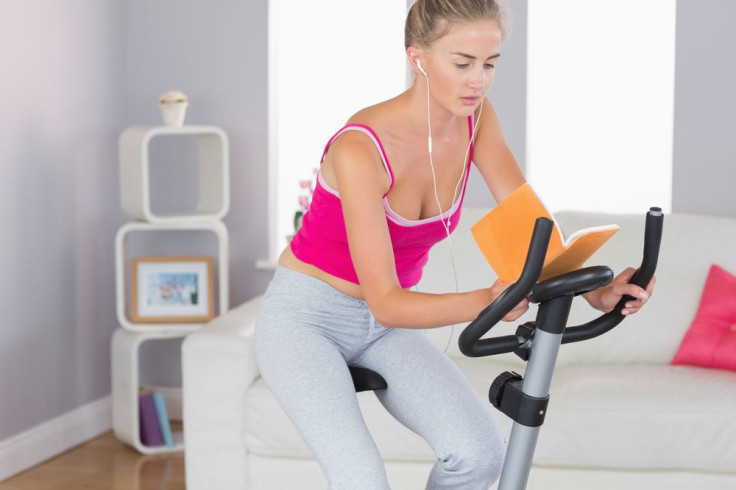Multitasking May Boost Fitness Level By Improving Motor Skills

There are two types of people in this world: those who read a book while on a stationary bike and those who don't. A new study from University of Florida investigates dual-tasking — spinning combined with mental tasks — among older adults. Surprisingly, the researchers discovered participants' cycling speed on a stationary bike improved while performing a simple cognitive test.
These results suggest combining an easy mental task, such as reading, with physical activity may be an easy way to get people of all ages to exercise more vigorously.
Wanting a better grasp on older adult abilities, 28 participants with Parkinson's disease and 20 healthy older adults completed 12 mental tests while sitting in a quiet room. Then, they ran through the same battery of tests — but this time while cycling on a stationary bike. The tests ranged from saying the word "go" when a blue star was shown on a projection screen to repeating increasingly long lists of numbers in reverse order of presentation. Meanwhile, the researchers measured their cycling speed via a video motion capture system.
“Every dual-task study that I'm aware of shows when people are doing two things at once they get worse,” Dr. Lori Altmann, an associate professor of speech, language, and hearing sciences at the College of Public Health and Health Professions, said in a press release. “Everybody has experienced walking somewhere in a hurry when the person in front of them pulls out a phone, and that person just slows to a crawl. Frankly, that's what we were expecting.”
Instead, the reverse happened.
Across all tasks, the participants’ test performance while cycling was similar to their baseline scores (in the quiet room). Meanwhile, the participants’ cycling speed increased during the cognitive tasks. In fact, they registered the highest speeds during the six easiest mental tasks.
Participants' cycling speed escalated by about 25 percent while doing the easiest cognitive tasks, and slowed as the mental tasks became more difficult. Still, the hardest tasks only brought participants back to the speeds at which they were cycling before beginning the cognitive tasks.
“As participants were doing the easy tasks, they were really going to town on the bikes, and they didn't even realize it,” Altmann said. “It was as if the cognitive tasks took their minds off the fact that they were pedaling.”
Exercise boosts arousal in brain regions that control movement and this increases the release of neurotransmitters that improve speed and efficiency of the brain, particularly the frontal lobes. This, then, may underly the improved performance of both motor and cognitive tasks.
The Parkinson's patients cycled slower overall and didn't speed up as much as the healthy participants. The researchers speculate that arousal in the brain is dependent on dopamine and other neurotransmitters and these are impaired in people with Parkinson's.
Still, the overall study results suggest that combining the easier mental tasks with physical activity may be one way to get people, whether they have Parkinson’s or not, to exercise more vigorously. Altmann and the senior researcher of this study, Dr. Chris Hass, an associate professor of applied physiology and kinesiology in the College of Health and Human Performance, plan to make this a topic for future research.
Source: Altmann LJ, Stegmoller E, Hazamy AA, et al. Unexpected Dual Task Benefits on Cycling in Parkinson Disease and Healthy Adults: A Neuro-Behavioral Model. PLOS ONE. 2015.



























